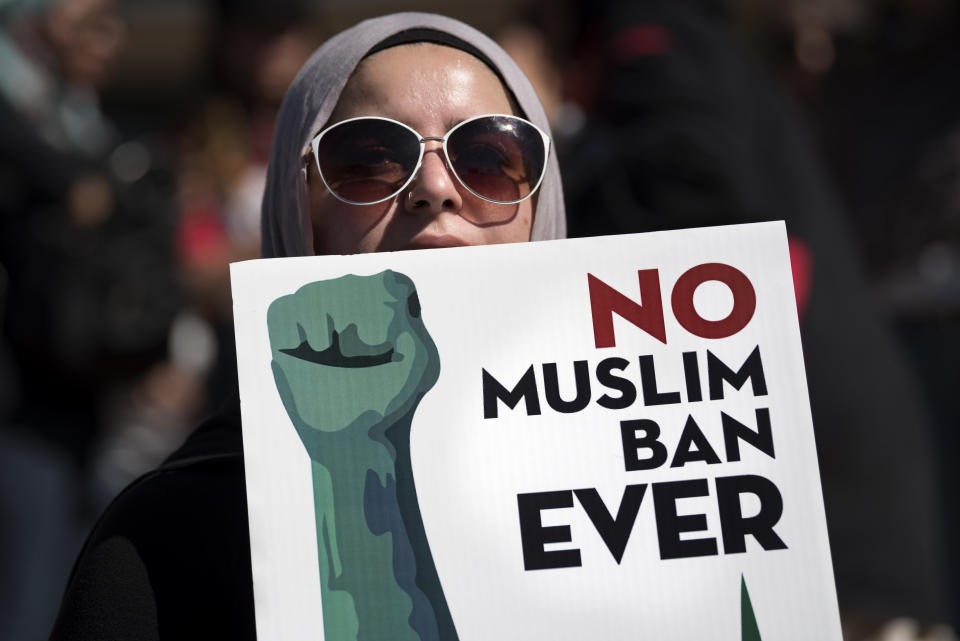Federal Judges In 2 States Block Trump's Latest Travel Ban
A federal court in Maryland was the second to block President Donald Trump’s third and most extensive initiative to limit travel into the United States on Wednesday. A Hawaii judge blocked the ban the day before, just hours before it was set to go into effect.
It represents an “extricable re-animation of the twice-enjoined Muslim ban,” Maryland District Judge Theodore D. Chuang said. His ruling is somewhat smaller in scope than that of his Hawaii counterpart, Judge Derrick Watson. It applies only to those who couldn’t prove a “bona fide” relationship with a family member or entity in the U.S.
The International Refugee Assistance Project, the Iranian Alliances Across Borders and various individual plaintiffs, including the state of Hawaii, filed lawsuits in Hawaii and Maryland after the travel ban ― which would indefinitely ban citizens from Chad, Iran, Libya, North Korea, Somalia, Syria, Venezuela and Yemen from entering the country ― was announced on Sept. 24. They view this ban as yet another thinly veiled attempt to target Muslims (six out of the eight countries on the list are Muslim-majority).
“EO-3 suffers from precisely the same maladies as its predecessor: it lacks sufficient findings that the entry of more than 150 million nationals from six specified countries would be ‘detrimental to the interests of the United States,’” the Hawaii court order said. The ban also “plainly discriminates based on nationality in the manner that the Ninth Circuit has found antithetical to both Section 1152(a) and the founding principles of this Nation,” it noted.
Non-visa holders from most of the countries listed have already been banned for the last several months, after the Supreme Court ruled to allow parts of a previous travel ban to go into effect in June. The latest initiative removed Sudan from the list, and added Chad, North Korea and Venezuela. It was planned to go into effect Wednesday.
Omar Jadwat, who is the director of the American Civil Liberty Union’s Immigrants’ Rights Project and was among those arguing the case in Maryland, called Trump’s ban “illegal and unconstitutional.”
“We’re glad, but not surprised, that President Trump’s illegal and unconstitutional Muslim ban has been blocked once again,” Jadwat said. “Like the plaintiffs in the Hawaii case, we are working to ensure the ban never takes effect.”
Making America Safe is my number one priority. We will not admit those into our country we cannot safely vet.https://t.co/KJ886okyfC
— Donald J. Trump (@realDonaldTrump) September 24, 2017
The changes were interpreted by many as mere political posturing ― an attempt to make the ban appear less overtly targeted toward Muslims.
“Each new version is just an updated version of the previous ones, and they all have one goal: to keep out people primarily from majority-Muslim countries,” Becca Heller, head of the International Refugee Assistant Project, said Monday. “We will not rest until this cruel and senseless policy is blocked for good.”
A White House statement released Tuesday afternoon called the Hawaii court order “dangerously flawed” and noted the travel ban was issued after an “extensive worldwide security review.”
“The entry restrictions in the proclamation apply to countries based on their inability or unwillingness to share critical information necessary to safely vet applications, as well as a threat assessment related to terrorism, instability, and other grave national security concerns,” the White House said. “These restrictions are vital to ensuring that foreign nations comply with the minimum security standards required for the integrity of our immigration system and the security of our Nation.”
The Department of Homeland Security “will comply with any lawful judicial order,” acting secretary Elaine Duke said in a statement, adding that they “look forward to prevailing in this matter upon appeal.” She said the “requirements are essential to securing the homeland.”

The new orders doesn’t directly implicate the U.S. refugee resettlement program because the Trump administration had already taken measures to limit the number of refugees able to seek safety in the country. The 120-day suspension included in the second iteration of the ban expires on Oct. 24. Experts don’t think the White House will replace it with a new refugee ban because the administration already slashed the annual resettlement ceiling to 45,000 for fiscal year 2018, the lowest it’s been since the program’s inception in 1980.
The series of limits placed on immigration places tens of thousands of people already in the resettlement pipeline in limbo. Plus, it precludes so many more from being able to begin the process.
For Amir Abbasi, 33, the uncertainty has been excruciating. (He asked for his name to be changed out of fear of persecution by authorities in his home country.) He and his partner fled Iran due to the persecution they faced for being gay. They illegally traveled to Turkey in 2014 and first went through the Canadian refugee pipeline.
They were told the country couldn’t handle any more cases, so earlier this year they began the process with the U.S. program. After one pre-screening interview, they stopped hearing from U.S. Citizenship and Immigration Services.
He no longer holds hope that his U.S. application will lead to anything, he said. He doesn’t know where to go or what to do.
“Life in Turkey is very hard,” he said. “We don’t have any access to job markets legally. Most LGBT refugees don’t have access to funds from their families. And if you work illegally you might be arrested and you might be deported to Iran.”
This story has been updated to include the Maryland federal court ruling.
Love HuffPost? Become a founding member of HuffPost Plus today.
This article originally appeared on HuffPost.

